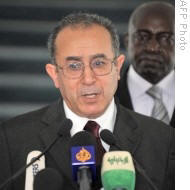|
AU Welcomes Somalia
President's Resignation

Africa's top peace and security
official has welcomed the resignation of Somalia's President
Abdullahi Yusuf, saying it clears the way for actions that could
prevent the country from descending into chaos as Ethiopian troops
withdraw.
AU Peace and Security Commissioner Ramtane Lamamra calls President
Yusuf's resignation a necessary act of self-sacrifice. In a
telephone interview, Lamamra said the Somali leader had become an
obstacle to efforts to bring stability to the lawless Horn of Africa
nation.
"Yusuf may have come himself to the conclusion that his presence as
head of state would not serve the cause of peace and reconciliation
in Somalia and he may have felt he eventually became part of the
problem rather than part of the solution, and in political life,
individuals have to make sacrifice when it comes to the supreme
interests of the country," said Lamamra.
President Yusuf's resignation comes days before Ethiopia withdraws
the troops it sent to Somalia two years ago to prop up his United
Nations-backed transitional government. The Ethiopian pullout leaves
only a 3,400-strong African Union peacekeeping force, leading to
fears that the increasingly weak government would collapse and be
replaced by Islamic extremists.
But Security Commissioner Lamamra says the resignation provides an
opening for several hopeful developments. On the domestic front, it
clears the way for the creation of a broader-based government of
national unity, as called for in an accord signed in Djibouti in
October with moderate Islamists from the Alliance for the
Re-liberation of Somalia, or ARS.
"I understand there are a lot of members of parliament who are
willing to put in place the expanded parliament and the cabinet of
national union that is provided for in the Djibouti political
process, and therefore this resignation may open new horizons for
the new configuration of the transitional institutions to be put in
place with the inclusion of the ARS representatives and whoever
would be representing other Somali stakeholders, including diaspora,"
he continued.
Lamamra says he also expects the United Nations Security Council to
act within 48 hours to pledge what he calls 'a very concrete
logistical package' that would strengthen the A peacekeeping force
known as AMISOM. He tells VOA a vote of support from the Security
Council would encourage greater African troop contributions, in the
hope that the force would eventually become a blue-helmeted U.N.
force.
"If by the end of this year, the end of this month, within the next
48 hours, we can receive a clear indication by the UN Security
Council that there is clearly an enhanced international commitment
to Somalia in the security field by giving AMISOM what it needs in
terms of enhancing its own effectiveness on the ground, and a clear
indication as well that the UN will be taking a larger role and
responsibility of the security areas of our mission. I think that
will help our effort to be successful," he said.
Lamamra declined to discuss the status of efforts to quickly get
more AMISOM troops in place to fill the security vacuum being left
by the departing Ethiopian troops. Ethiopia has set a firm end of
the month deadline for ending its presence in Somalia, but officials
in Addis Ababa have said it might extend that presence by a few days
to ensure the safety of the AMISOM peacekeepers.
As the pullout deadline approaches, there have been reports of
heightened tensions in the capital, Mogadishu and clashes among
Islamic factions poised to take power if the transitional government
collapses.
The government's deputy minister for reconciliation was reported
assassinated Sunday in the provisional capital, Baidoa. VOA has also
learned of an unsuccessful attempt last week on the life of the
moderate ARS leader, Sheik Sharif Sheik Ahmed.
Members of President Yusuf's security force abruptly fled Mogadishu
Monday, hours before he resigned. News reports say the 100-strong
militia flew to Yusuf's stronghold in northern Somalia.
Source: VOA
|
